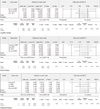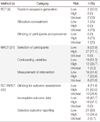Abstract
Purpose
The purpose of this study was to analyze the characteristics and effect size of the intervention study applied to the depression of the cancer patient.
Methods
A total of 749 studies published from 1990 to 2011 were searched through the search databases and among them, 35 examples satisfied the inclusion criteria. Three independent researchers implemented the methodological qualitative evaluation. The data were analyzed using meta-analysis.
Results
For the depression of the cancer patient, 19 various interventions were applied. The size of the intervention effect that can be analyzed in terms of effect size came out as OR of the laugh therapy 8.122 (p=.073), OR of the music therapy 4.418 (p=.014), OR of the integrated therapy 4.418 (p=.015).
Figures and Tables
Fig. 2
Effect size by intervention (laughter therapy, music therapy, integrated therapy) on cancer-related depression.

References
1. Korea Central Cancer Registry. Cancer registry and statistics. Accessed March 14, 2013. http://ncc.re.kr/manage/manage03_033_list.jsp.
2. Bae SH, Park JS. Symptom distress and spiritual well-being in patients with cancer according to illness and treatment. J Korean Acad Fundam Nurs. 2007. 14:457–465.
3. Ohnishi H. Mental distress in cancer patients. Masui. 2011. 60:1024–1031.
4. Bultz BD, Carlson LE. Emotional distress: The sixth vital sign-future directions in cancer care. Psychooncology. 2006. 15:93–95.

5. Kang JI, Namkoong K. Psychosocial aspects and mental health in cancer patients. J Korean Neuropsychiatr Assoc. 2007. 46:421–429.
6. Cho SJ. Psychiatric and psychosocial intervention for cancer patients and their families. J Korean Neuropsychiatr Assoc. 2007. 46:430–446.
7. Lee SJ, Kim JH, Park YM. Influence of depression on cancer metastasis. J Korean Oncol Nurs. 2008. 8:105–110.
8. Pinquart M, Duberstein P. Depression and cancer mortality: A meta-analysis. Psychol Med. 2010. 40:1797–1810.

9. National Cancer Center. Development of recommendations for distress management toward improvement of quality of life in cancer patients. 2009. Ministry of Health and Welfare.
10. Kim MY, Lee CS. Research trends of "cancer-related depression": Analysis using MeSH in PubMed. Proc Korean Soc Inf Manage Conf. 2012. 19:143–146.
11. Kim JN, I R. A review of research on the psychosocial interventions for the cancer patients. Korean J Health Psychol. 2008. 13:329–357.

12. Zhang JM, Wang P, Yao J, Zhao L, Davis MP, Walsh D, et al. Music interventions for psychological and physical outcomes in cancer: A systematic review and meta-analysis. Support Care Cancer. 2012. 20:3043–3053.

13. Conn VS, Hafdahl AR, Porock DC, McDaniel R, Nielsen PJ. A meta-analysis of exercise interventions among people treated for cancer. Support Care Cancer. 2006. 14:699–712.

14. Osborn RL, Demoncada AC, Feuerstein M. Psychosocial interventions for depression, anxiety, and quality of life in cancer survivors: Meta-analyses. Int J Psychiatry Med. 2006. 36:13–34.

16. Nam JH, Kim ER. A meta-analysis of the group art therapy effect on depression. Korean Art Ther Assoc. 2012. 19:993–1006.

17. Hong SH. A meta-analysis of the effects of horticultural therapy [dissertation]. 2006. Seoul: Hanyang Univ..
18. Kim SJ. The meta-analysis of the cognitive-behavioral group counseling effect on depression [dissertation]. 2001. Seoul: Sookmyung Women's Univ..
19. Oh PJ, Yoo JH. A Meta-analysis of intervention studies on nausea and vomiting in cancer patients. Korean J Adult Nurs. 2011. 23:340–350.
20. Oh PJ, Jung JA. A Meta-analysis of intervention studies on cancer-related fatigue in Korea: 1990-2010. J Korean Clin Nurs Res. 2011. 17:163–175.
21. Park YM. Systematic review of endoscopic submucosal dissection versus endoscopic mucosal resection for early gastric cancer [dissertation]. 2010. Seoul: Yonsei Univ..
22. Seo HJ. Palliative chemotherapy for advanced or metastatic colorectal cancer; systematic review [dissertation]. 2009. Seoul: Yonsei Univ..
23. Egger M, Davey Smith G, Schneider M, Minder C. Bias in meta-analysis detected by a simple, graphical test. BMJ. 1997. 13:629–634.

24. Mantzoukas S. The research evidence published in high impact nursing journals between 2000 and 2006: A quantitative content analysis. Int J Nurs Stud. 2009. 46:479–489.

25. Ko E, So HS, Cho IS, Kim HY, Kim YJ, Seo NS, et al. Analysis of the korean cancer nursing research trends from the Year of 2003 to 2009. Chonnam J Nurs Sci. 2010. 15:29–45.
26. Park DH, Baik SK. Design and conduct of randomized controlled trials. Korean J Hepatol. 2006. 12:309–314.
27. Jun MH, Uhm DC, Jeong SH. The Analysis of the Korean Nursing Research Trends on Complementary and Alternative Therapies for Cancer Patients. J Korean Oncol Nurs. 2009. 9:67–75.
28. Williams S, Dale J. The effectiveness of treatment for depression/depressive symptoms in adults with cancer: A systematic review. Br J Cancer. 2006. 94:372–390.

29. Rehse B, Pukrop R. Effects of psychosocial interventions on quality of life in adult cancer patients: Meta analysis of 37 published controlled outcome studies. Patient Educ Couns. 2003. 50:179–186.

30. Kim MS. A study on the effect of the compliment and laughing program for schizophenic patients' self-esteem and inter-personal relationship [dissertation]. 2009. Gyeongbuk: Daegu Univ..




 PDF
PDF ePub
ePub Citation
Citation Print
Print






 XML Download
XML Download